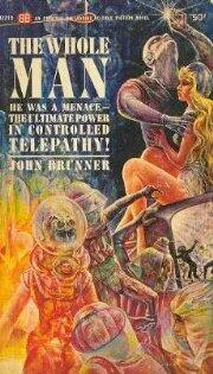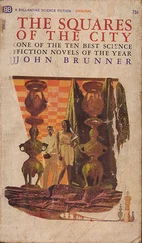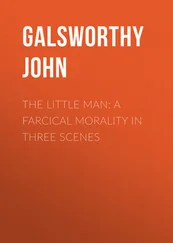He had asked whose this remarkable mind was, naturally, and the answer — that it was the half-legendary Ilse Kronstadt, on whom had been based a character in the movie he had watched along with the man in brown — made him even less inclined to pester her.
There were also the non-telepathists who stood out. Singh was the most striking. He had a mind as clear as standing water, into which one might plunge indefinitely without fathoming the limits of his compassion. Again, though, Howson preferred not to dip into Singh’s awareness.
Too much of it was concerned with his own plight, and the patent impossibility of healing his deformity.
He chose rather to touch the minds that were more ordinary — staff and patients. At first he moved with utmost caution; then as he grew surer of his skill he grew bolder also, and spent long hours in contemplation that appealed to him the same way as movies and TV had formerly done. This was so much richer that the TV set standing in the corner of his room was not turned on after the first week of his stay.
The hospital held patients and staff of more than fifty nationalities. Their languages, customs, hopes and fears were endlessly fascinating to him, and it was only when he came back to reality, drunk with the delight of shared experience, after a voyage through a dozen minds, that he found himself seriously inclined to fall in with the wishes of Singh and Waldemar.
Yet he still hung back. There was one group of patients in the hospital whose minds he could not fail to be aware of, and who were sometimes responsible for him waking in the middle of the night, sweat-drenched, a victim of nameless terrors. They were the insane, lost in their private universes of illogic, and of course it was among them that the work of the staff telepathists lay.
Once, and only once, he “watched” a telepathic psychiatrist brace himself for a therapeutic session. The patient was a paranoid with an obsessive sexual jealousy, and the telepathist was attempting to locate the root experiences behind it. It was too big a job to be completed by telepathy, of course; once the experiences had been identified, there would be hypnosis, drug-abreaction and probably a regression in coma to bring the man to terms with his past. At the moment, though, his brain was a hell of irrational torments, and the telepathist had to pick his way through them like a man braving a jungle crammed with monsters.
Howson did not stay with the psychiatrist past that point. But he was more afraid than ever afterwards.
And then the crisis broke, and Howson, unco-operative, was left on one side while frantic attempts were made at rescue.
His picture of what was really going on remained for a long time rather confused. He hadn’t bothered to look at a newspaper or switch on a TV news bulletin for weeks now; if he had done so he would have learned immediately that Hemmikaini’s “second-best” hadn’t been good enough, and as a result the crisis in Southern Africa had turned into a duty, bloody, tangled mess.
While Makerakera the expert on aggression sweated frantically to weld together a scratch team of whoever could be spared to join him — Choong from Hong Kong, Jenny Fender from Indiana, Stanislaus Danquah from Accra, and some trainees — the little Greek Pericles Phranakis turned his back on the catastrophe and went away down a path of his own, to a land where success had crowned his efforts with a wreath of bay.
At Salisbury, Nairobi, Johannesburg the troops came down from the sky; after them, the mobile hospitals, the transport “copters, the cans and sacks and bales of basic food; after them, the jurists and the politicians (what do you do with a man in jail on a murder charge when the organs of the arraigning government collapse?). A great hollow silence succeeded the tumult, and it was broken by the sound of children crying.
Meantime, a Mach Five stratoplane carried the shell of Pericles Phranakis to Ulan Bator, and the computers were proved right: it would take Ilse Kronstadt to cope with the crisis, and if she couldn’t go to it, it would come to her.
Howson caught stray images from the fantasy Phranakis was enjoying, and shuddered. He was reminded strongly of his own daydreams which — according to Danny Waldemar, at least — might finally have tempted him to enter a catapathic grouping with the deaf-and-dumb girl. Thinking of the first such, he remembered the dust on Vargas’s eyes, and almost moaned aloud.
A curious sense of isolation had resulted from the diversion of everyone’s thoughts to Phranakis, and in a panic because he was experiencing loneliness — worse by contrast with the month-long flow of concern about him that he had been basking in — he hastened to involve himself with the problems occupying the outstanding minds near him.
He did not immediately venture to intrude on the privacy of Ilse Kronstadt herself, but he sensed her anxiety like a bad odor. Dimly he grasped the fact that even if Phranakis had failed he was still regarded as the nearest competitor she had in her original specialty, the elimination of aggression; facing the task of breaking open his fantasy, she quailed.
Embarrassed, he switched his attention elsewhere, and found Phranakis forming a paranoid obsession in the forefront of the staff’s collective mind. Like a flight of crows following a ploughman, people who knew him were coming in, and the voices of the dead on paper and on record and on film spoke guidance to Ilse Kronstadt. When he was five years old, he did such-and-so; with his first girl, he liked to do this; during his training in telepathy he had difficulty with that.
As a sculptor might take odds and ends of scrap metal and fuse them into a work of art, Ilse Kronstadt now selected from these data and created a mental image of Phranakis. Howson was fascinated; he was so absorbed that he never realized when he trespassed on her awareness for the first time. Either she did not notice that he was “watching” her, or she was too preoccupied to care. He thought the latter, and felt a stab of guilt at his unwillingness to exploit his own talent as she was exploiting hers.
Sitting still as stone in the special chair more comfortable than any he had used before, he absorbed the self-disciplining methods by which she built up her sagging confidence. There were glimpses of past successes, which had seemed equally daunting yet which ended in triumph; there were concepts of self-esteem, conceit almost, deliberately fostered to strengthen her determination.
Howson followed all this with jaw-cramping concentration. Even so, when he let his mind wander towards Phranakis, he was shaken. How could anyone — even the unprecedented Dr. Kronstadt — disturb the armored fantasy around the man’s ego now?
He forgot he was Gerald Howson. He forgot he was a cripple, a runt, a bleeder, an orphan. He remembered only that he was a telepathist, able to snatch facts from any mind he chose if the owner gave permission, and with desperate eagerness filled out his knowledge of what had led to his impasse.
Phranakis: this was how he felt to himself before he went into fugue; this was the face he saw daily in his mirror; this was the mother he remembered, the father, the brothers and sisters; there was the stony village street up which he toiled to school, this was the road that took him to Athens and the disappointments of early manhood, this was the room where he was first shocked into knowledge of his real identity…
Southern Africa: this was the ulcer festering below the slick modern surface; this was the hatred of dark against light skin and this was the greed that burst into violence… He visualized the huge Polynesian, Makerakera, walking a sunny street and absorbing hate like a camera; he was one of the rare receptive telepathists with no projective “voice’, like the therapy watchdogs and lay analysts Howson had met here at the hospital. He knew images of long corridors, rooms where solemn men met to plan this first attempt to give meaning to the ancient platitude about the best time to stop a war. He sensed the reaction of Phranakis when he realized his work had failed — he saw it as nemesis, the reward of hubris, the illimitable conceit which offended the gods of his ancestors.
Читать дальше












